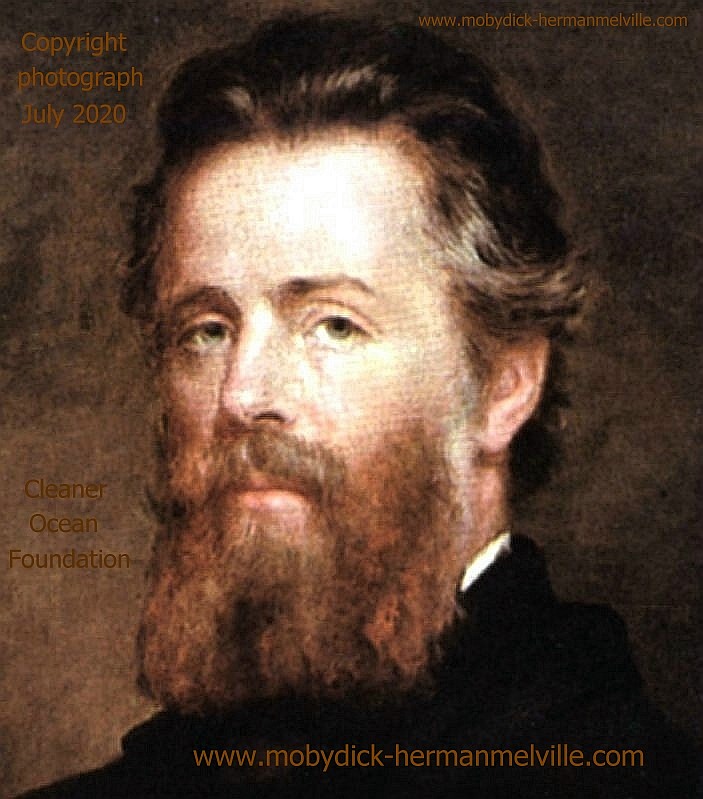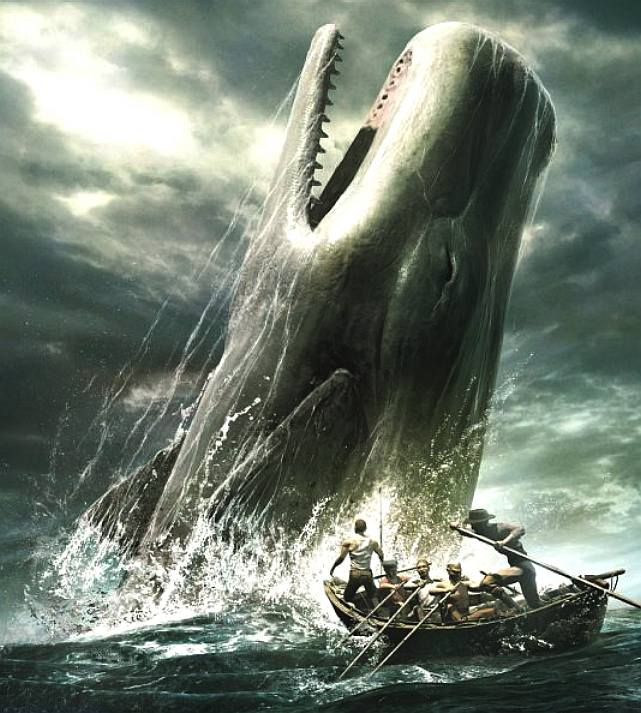
Herman
Melville was the author of an account of what we'd now consider an illegal activity,
the commercial hunting of whales for oil and meat.
Back <<<
CHAPTER 5.
Breakfast
I quickly followed suit, and descending into the bar-room accosted the grinning landlord very pleasantly. I cherished no malice towards him, though he had been skylarking with me not a little in the matter of my bedfellow.
However, a good laugh is a mighty good thing, and rather too scarce a good thing; the more's the pity. So, if any one man, in his own proper person, afford stuff for a good joke to anybody, let him not be backward, but let him cheerfully allow himself to spend and be spent in that way. And the man that has anything bountifully laughable about him, be sure there is more in that man than you perhaps think for.
The bar-room was now full of the boarders who had been dropping in the night previous, and whom I had not as yet had a good look at. They were nearly all whalemen; chief mates, and second mates, and third mates, and sea carpenters, and sea coopers, and sea blacksmiths, and harpooneers, and ship keepers; a brown and brawny company, with bosky beards; an unshorn, shaggy set, all wearing monkey jackets for morning gowns.
You could pretty plainly tell how long each one had been ashore. This young fellow's healthy cheek is like a sun-toasted pear in hue, and would seem to smell almost as musky; he cannot have been three days landed from his Indian voyage. That man next him looks a few shades lighter; you might say a touch of satin wood is in him. In the complexion of a third still lingers a tropic tawn, but slightly bleached withal; HE doubtless has tarried whole weeks ashore. But who could show a cheek like Queequeg? which, barred with various tints, seemed like the Andes' western slope, to show forth in one array, contrasting climates, zone by zone.
"Grub, ho!" now cried the landlord, flinging open a door, and in we went to breakfast.
They say that men who have seen the world, thereby become quite at ease in manner, quite self-possessed in company. Not always, though: Ledyard, the great New England traveller, and Mungo Park, the Scotch one; of all men, they possessed the least assurance in the parlor. But perhaps the mere crossing of Siberia in a sledge drawn by dogs as Ledyard did, or the taking a long solitary walk on an empty stomach, in the negro heart of Africa, which was the sum of poor Mungo's performances—this kind of travel, I say, may not be the very best mode of attaining a high social polish. Still, for the most part, that sort of thing is to be had anywhere.
These reflections just here are occasioned by the circumstance that after we were all seated at the table, and I was preparing to hear some good stories about whaling; to my no small surprise, nearly every man maintained a profound silence. And not only that, but they looked embarrassed. Yes, here were a set of sea-dogs, many of whom without the slightest bashfulness had boarded great whales on the high seas—entire strangers to them—and duelled them dead without winking; and yet, here they sat at a social breakfast table—all of the same calling, all of kindred tastes—looking round as sheepishly at each other as though they had never been out of sight of some sheepfold among the Green Mountains. A curious sight; these bashful bears, these timid warrior whalemen!
But as for Queequeg—why, Queequeg sat there among them—at the head of the table, too, it so chanced; as cool as an icicle. To be sure I cannot say much for his breeding. His greatest admirer could not have cordially justified his bringing his harpoon into breakfast with him, and using it there without ceremony; reaching over the table with it, to the imminent jeopardy of many heads, and grappling the beefsteaks towards him. But THAT was certainly very coolly done by him, and every one knows that in most people's estimation, to do anything coolly is to do it genteelly.
We will not speak of all Queequeg's peculiarities here; how he eschewed coffee and hot rolls, and applied his undivided attention to beefsteaks, done rare. Enough, that when breakfast was over he withdrew like the rest into the public room, lighted his tomahawk-pipe, and was sitting there quietly digesting and smoking with his inseparable hat on, when I sallied out for a stroll.
Next
>>>
BOOK
CHAPTERS
CHAPTER 1. Loomings.
CHAPTER
2. The Carpet-Bag.
CHAPTER
3. The Spouter-Inn.
CHAPTER
4. The Counterpane.
CHAPTER
5. Breakfast.
CHAPTER
6. The Street.
CHAPTER
7. The Chapel.
CHAPTER
8. The Pulpit.
CHAPTER
9. The Sermon.
CHAPTER
10. A Bosom Friend.
CHAPTER
11. Nightgown.
CHAPTER
12. Biographical.
CHAPTER
13. Wheelbarrow.
CHAPTER
14. Nantucket.
CHAPTER
15. Chowder.
CHAPTER
16. The Ship.
CHAPTER
17. The Ramadan.
CHAPTER
18. His Mark.
CHAPTER
19. The Prophet.
CHAPTER
20. All Astir.
CHAPTER
21. Going Aboard.
CHAPTER
22. Merry Christmas.
CHAPTER
23. The Lee Shore.
CHAPTER
24. The Advocate.
CHAPTER
25. Postscript.
CHAPTER
26. Knights and Squires.
CHAPTER
27. Knights and Squires.
CHAPTER
28. Ahab, Captain.
CHAPTER
29. Enter Ahab; to Him, Stubb.
CHAPTER
30. The Pipe.
CHAPTER
31. Queen Mab.
CHAPTER
32. Cetology.
CHAPTER
33. The Specksnyder.
CHAPTER
34. The Cabin-Table.
CHAPTER
35. The Mast-Head.
CHAPTER
36. The Quarter-Deck.
CHAPTER
37. Sunset.
CHAPTER
38. Dusk.
CHAPTER
39. First Night Watch.
CHAPTER
40. Midnight, Forecastle.
CHAPTER
41. Moby Dick.
CHAPTER
42. The Whiteness of The Whale.
CHAPTER
43. Hark!
CHAPTER
44. The Chart.
CHAPTER
45. The Affidavit.
CHAPTER
46. Surmises.
CHAPTER
47. The Mat-Maker.
CHAPTER
48. The First Lowering.
CHAPTER
49. The Hyena.
CHAPTER
50. Ahab's Boat and Crew. Fedallah.
CHAPTER
51. The Spirit-Spout.
CHAPTER
52. The Albatross.
CHAPTER
53. The Gam.
CHAPTER
54. The Town-Ho's Story.
CHAPTER
55. Of the Monstrous Pictures of Whales.
CHAPTER
56. Of the Less Erroneous Pictures of Whales, and the True
CHAPTER
57. Of Whales in Paint; in Teeth; in Wood; in Sheet-Iron; in
CHAPTER
58. Brit.
CHAPTER
59. Squid.
CHAPTER
60. The Line.
CHAPTER
61. Stubb Kills a Whale.
CHAPTER
62. The Dart.
CHAPTER
63. The Crotch.
CHAPTER
64. Stubb's Supper.
CHAPTER
65. The Whale as a Dish.
CHAPTER
66. The Shark Massacre.
CHAPTER
67. Cutting In
CHAPTER
69. The Funeral.
CHAPTER
70. The Sphynx.
CHAPTER
71. The Jeroboam's Story.
CHAPTER
72. The Monkey-Rope.
CHAPTER
73. Stubb and Flask Kill a Right Whale; and Then Have a Talk
CHAPTER
74. The Sperm Whale's Head—Contrasted View.
CHAPTER
75. The Right Whale's Head—Contrasted View.
CHAPTER
76. The Battering-Ram.
CHAPTER
77. The Great Heidelburgh Tun.
CHAPTER
78. Cistern and Buckets.
CHAPTER
79. The Prairie.
CHAPTER
80. The Nut.
CHAPTER
81. The Pequod Meets The Virgin.
CHAPTER
82. The Honour and Glory of Whaling.
CHAPTER
83. Jonah Historically Regarded.
CHAPTER
84. Pitchpoling.
CHAPTER
85. The Fountain.
CHAPTER
86. The Tail.
CHAPTER
87. The Grand Armada.
CHAPTER
88. Schools and Schoolmasters.
CHAPTER
89. Fast-Fish and Loose-Fish.
CHAPTER
90. Heads or Tails.
CHAPTER
91. The Pequod Meets The Rose-Bud.
CHAPTER
92. Ambergris.
CHAPTER
93. The Castaway.
CHAPTER
94. A Squeeze of the Hand.
CHAPTER
95. The Cassock.
CHAPTER
96. The Try-Works.
CHAPTER
97. The Lamp.
CHAPTER
98. Stowing Down and Clearing Up.
CHAPTER
99. The Doubloon.
CHAPTER
100. Leg and Arm.
CHAPTER
101. The Decanter.
CHAPTER
102. A Bower in the Arsacides.
CHAPTER
103. Measurement of The Whale's Skeleton.
CHAPTER
104. The Fossil Whale.
CHAPTER
105. Does the Whale's Magnitude Diminish?—Will He Perish?
CHAPTER
106. Ahab's Leg.
CHAPTER
107. The Carpenter.
CHAPTER
108. Ahab and the Carpenter.
CHAPTER
109. Ahab and Starbuck in the Cabin.
CHAPTER
110. Queequeg in His Coffin.
CHAPTER
111. The Pacific.
CHAPTER
112. The Blacksmith.
CHAPTER
113. The Forge.
CHAPTER
114. The Gilder.
CHAPTER
115. The Pequod Meets The Bachelor.
CHAPTER
116. The Dying Whale.
CHAPTER
117. The Whale Watch.
CHAPTER
118. The Quadrant.
CHAPTER
119. The Candles.
CHAPTER
120. The Deck Towards the End of the First Night Watch.
CHAPTER
121. Midnight.—The Forecastle Bulwarks.
CHAPTER
122. Midnight Aloft.—Thunder and Lightning.
CHAPTER
123. The Musket.
CHAPTER
124. The Needle.
CHAPTER
125. The Log and Line.
CHAPTER
126. The Life-Buoy.
CHAPTER
127. The Deck.
CHAPTER
128. The Pequod Meets The Rachel.
CHAPTER
129. The Cabin.
CHAPTER
130. The Hat.
CHAPTER
131. The Pequod Meets The Delight.
CHAPTER
132. The Symphony.
CHAPTER
133. The Chase—First Day.
CHAPTER
134. The Chase—Second Day.
CHAPTER
135. The Chase.—Third Day.
Epilogue

Moby
Dick is the antogonist in this story of a great white 'bull' sperm whale that fought back at
whalers who tried to harpoon him.
The idea came to Herman Melville after
he spent time on a commercial whaler, where stories abounded of the
sinking of the Essex in 1821 and Mocha
Dick, a giant sperm whale that sank around 20 ships, before being
harpooned in 1838.
Herman
realised how fixated the sailors became, and he also became with the
thought that there was a whale that nobody could catch, that represented
a real risk to the whalers hunting whales, in that it was more sport
than commercial operations.
Without
any doubt this is one of the greatest novels coming out of America at
this time and way off the beaten track, making it so interesting,
reflecting the state of whaling and the economic importance in the
developing the nation - giving the general public a taste of something
adventurous that most people never think about.
Many
films and graphic novel adaptations have been inspired by the writings
of Herman Melville, from Marvel
and Disney
comics with good cause.
One
such production in 2020 is a graphic novel about a giant humpback whale
called Kulo
Luna, that sinks a modern whaling boat, much as depicted in Herman
Melville's Moby
Dick, except that is this day and age whales have explosive harpoons
to contend with, and sonar, from which there is no escape.
Please use our
A-Z INDEX to
navigate this site

